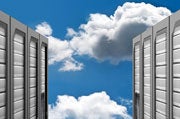So, your business has grown large enough that you need your first server. Congratulations! Acquiring a server is a big decision, so some trepidation is understandable. This guide will explain the basic principles of the technology, help you decide which class of server will best fit your needs, and give you some ballpark pricing, so you don’t overspend or acquire a product that’s insufficient for your needs.
I’ll also explore the chief alternative to running your own server--relying on the cloud--and provide a primer on one of today’s hottest server trends: virtualization. You’ll find this guide useful even if you ultimately decide to hire an IT consultant to analyze your requirements and make a purchase recommendation.
Server Basics
Although a small server might look no different from a high-end desktop PC, the machines are designed for very different tasks. A desktop computer is designed for one person who needs a user-friendly operating system to run desktop applications such as a word processor, a spreadsheet, an email client, and a Web browser. A server runs a specialized operating system designed to support many users. It’s engineered to run multiuser applications such as email, messaging, and print servers; shared calendar programs; databases; and enterprise resource planning and customer relationship management software.
A server also makes it easy for your employees to share data and collaborate, since it operates as a central repository for all of your documents, images, contacts, and other important files. It can host a company intranet, for sharing information with your employees quickly and economically. Set up a virtual private network, and you and your employees can access the data on the server remotely from anywhere you have Internet access. On top of that, a server can automatically back up your desktop and laptop systems, so you’ll never lose critical data if one machine fails or is lost or stolen. Servers are designed to be reliable, secure, and fault-tolerant, with redundant storage options. If you expect your business to expand, choose a server that’s scalable and can grow with you.
If you operate a small to medium-size business, the question isn’t "Do I need a server?" but "Which type of server do I need?" Before we get into that, however, let's address the number-one alternative to operating and maintaining an on-site server: relying on the cloud.
The Cloud Alternative
Why not put everything in the cloud? Services such as Amazon Web Services, Microsoft’s Windows Azure, and Rackspace Cloud Hosting offer a number of benefits. For starters, they don't involve a significant capital outlay, and you won’t need an IT staff to manage the server. You won’t need to worry about the equipment or software becoming outdated or obsolete, either. In the days when businesses relied on big-iron mainframes, this strategy was called "time sharing." And the cloud is burdened with many of the same limitations as that model was.
Storing your data on equipment outside your immediate control also brings up privacy and security concerns. And although you’re not paying for an IT staff, ongoing maintenance, and investments in new capital equipment directly, you’re still incurring a share of those costs indirectly--they’re reflected in the fees you’re paying the service provider. The cloud is no cure-all.
Choose the Right Server for Your Needs
The big names in the server market are Dell, Fujitsu, HP, IBM, Lenovo, and Oracle. Choosing the right server depends in large measure on the applications you intend to run on it. If all you need is file sharing, automated client backup, and light-duty remote access for PCs (typically ten or fewer), consider a NAS or even a Windows Home Server machine; HP, Netgear, QNAP, Seagate, and Synology are the major players in this arena. If your business has more than ten employees using computers, if you need to operate an email or print server, manage a complex database, or run sophisticated server-based applications (such as ERP or CRM), if you have very large storage requirements, or if you require large-scale virtualization capabilities, you’ll want a more robust option such as a tower, rack, or blade server.
A Virtual-Machine Primer
Virtualization enables one server to behave as several servers, each with its own operating system and unique set of applications. A virtual machine consists solely of software, yet it has all the components of a physical machine: It has a motherboard, a CPU, a hard disk, a network controller, and so on. The operating system and other applications run on a virtual machine just as they would on a physical machine--they see no difference between the two environments.
In virtualization, a program known as a hypervisor places an abstraction layer between the operating systems and the hardware. The hypervisor can operate multiple virtual machines with the same operating system or different OSs on the same physical server. Microsoft, Oracle, and VMware are among the top virtual-machine developers.
How does virtualization make more efficient use of your IT resources? Servers are designed to accommodate peak--versus average--loads, so they’re underutilized most of the time. In fact, the typical server utilizes only between 5 and 15 percent of its overall resources. Running several virtual machines on one physical server uses those resources more efficiently, boosting utilization to between 60 and 80 percent. Instead of operating one physical server for email, one for database management, one for your intranet, and yet another for CRM, you can run all of those applications on several virtual machines running on the same physical hardware.
Virtualization eliminates the need for additional physical servers, and the tech-support overhead, power, cooling, backup, physical space, and other requirements that go along with them. What’s more, you can deploy a new virtual server in a few minutes.
Now let's examine the various server options on today’s market, starting with the most basic.
 4:29:00 AM
4:29:00 AM



 Posted in:
Posted in: 

0 comments:
Post a Comment